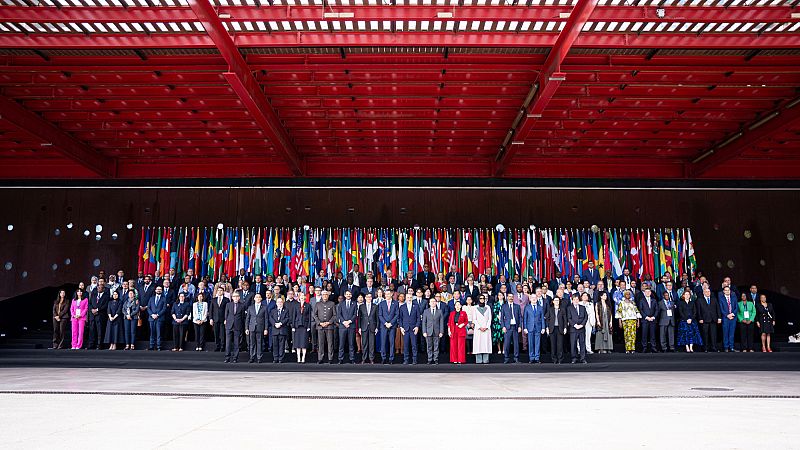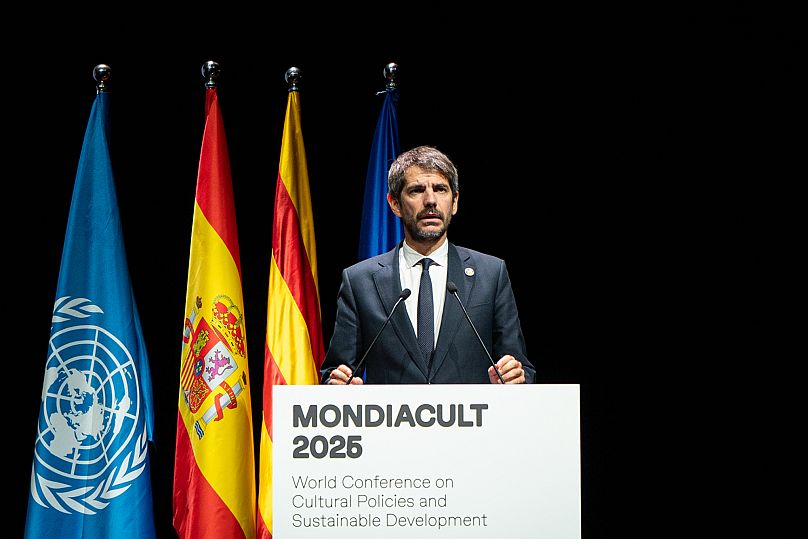Mondiacult ends with promises and pledges to spread peace through culture

Mondiacult, the world's largest conference on cultural policy and sustainable development, held its 2025 edition in Barcelona this week with thousands of participants and more than 150 ministers of culture, gathered to set the global agenda for culture in the coming years.
Conspicuous by their absence, neither Israel nor the United States took part in the conference as a result of President Donald Trump's planned withdrawal from UNESCO, at the end of 2026.
The previous Mondiacult, attended by 150 nations, was held Mexico in 2022 and the aim of this edition was to follow up on deals reached there and explore two major current issues: artificial intelligence (AI) and the culture of peace.
The Mondiacult forum concluded without any binding decisions, but with a declaration of intent that aims to guide cultural policies over the next five years. The participants agreed on two main axes: placing cultural rights at the center of public policies and integrating culture as a specific area within the United Nations post-2030 development agenda.
The final document, approved by all ministers and delegations, also proposes the equalization of cultural diversity and biodiversity, culture as a driver of dialogue in favour of peace and the need to protect creators against the impact of artificial intelligence to avoid situations of precariousness and digital exploitation.
During the closing of the meeting, the Spanish Minister of Culture, Ernest Urtasun, recalled that "culture awakens consciences and inspires action" and stressed the importance of defending its legacy.
Mexico's Secretary of Culture, Claudia Curiel de Icaza, stressed that "diversity and communality are ways to resolve conflicts" in the face of global challenges ranging "from wars to the environmental crisis".
Curiel de Icaza stressed the importance of recognising cultural rights and ancestral traditions, also demanding the return of stolen goods, with the recognition of their original roots. He stressed that Mexico is moving towards a more inclusive development, where "asking forgiveness for the affronts is indispensable for healing".
Audrey Azoulay, director general of UNESCO, spoke at the closing and pointed out that the forum sends "a clear message to the world". adding that the meeting served to strengthen multilateralism and establish a common working platform on shared challenges at the global level
Meanwhile, the President of the Generalitat of Catalonia, Salvador Illa, thanked UNESCO for holding the Mondiacult Summit in Barcelona. Illa offered the city of Barcelona to the UN agencies for whatever may be necessary and recalled the 50th anniversary of Catalan culture, "based on cultural diversity, dialogue and respect for others". Ernesto Ottone pointed out that the next edition of Mondiacult will be held in Riyadh, Saudi Arabia.
Rebuilding Gaza
The Spanish Ministry of Culture pledged to contribute €200,000 to the UNESCO Fund for the reconstruction of Gaza. Part of that sum will be spent on providing psychosocial aid for students, heritage protection and direct support to journalists.
This contribution is in addition to the 100,000 euros that the Ministry of Culture contributes annually to the TEJA programme, an international cultural solidarity network that provides help to artists and cultural professionals in emergency situations. Through this support, Palestinian artists travel to Spain to carry out artistic residencies.
Spain also made clear its efforts to drive different initiatives in collaboration with UNRWA, the United Nations Agency for the Palestine Refugee Population, with the aim of supporting Gaza and the Palestinian population.
Since last week, the Thyssen-Bornemisza National Museum and the National Museum of Anthropology have been hosting 'Gaza through their eyes', an exhibition that brings together photographs taken by UNRWA photojournalists who, since October 2023, have been documenting life in the Gaza Strip under Israeli siege.
Calls for peace in Gaza drew long ovations and loud applause at the opening ceremony. Spain's Minister of Culture, Ernest Urtasun, stressed that "we cannot think of development without culture" and spoke of "building peace as the basis for social justice".
The Minister of Foreign Affairs, José Manuel Albares, said that"a people cannot be free without culture and cannot defend itself without democracy". Albares reiterated that to support the existence of a Palestinian state is to support its culture: "In every war, apart from the military offensive, there is always a desire to annihilate a language, a culture, a heritage. Barbarism goes hand in hand with the destruction of a cultural heritage".
Defining global cultural policies for the coming years
The Chilean Ernesto Ottone, Assistant Director-General for Culture at UNESCO, explained that "Mondiacult is being held at a decisive moment to make culture a lever for sustainable development".
Mondiacult did agree on text for its First Global Report on Cultural Policy to highlight the investment gap between the North and the South (the global North invests 20 times more in culture), reflecting a real imbalance.
In Mondiacult 2025, the thematic axes being addressed are cultural rights, culture in the digital age, the integration of culture in education, the economy of culture, the cultural dimensions of climate change and the defence of heritage in crisis and emergency situations. In addition, two current issues of great interest to the culture sector, such as artificial intelligence (AI) and the culture of peace, were included in the debate at Spain's request.
The Spanish Minister of Culture explained that "in a world marked by tensions, conflicts and multiple crises, from climate change to the impacts of the digital revolution and the arrival of AI. We need to remember that culture is also a form of resistance and a common language to rebuild trust between peoples".
Climate change, indigenous peoples and environmental preservation
Mondiacult is also working on another report on indigenous peoples and their role in the preservation of the environment. In the parallel sessions dedicated to the climate crisis, the presence of delegations from remote parts of the world such as Esuatini and Swaziland, a small landlocked monarchy in southern Africa, famous for its nature reserves, is particularly noteworthy.
Barcelona also welcomed hosts representing Tuvalu, a small Pacific country that could disappear due to climate change, and Kiribati, a Pacific archipelago that is among the most vulnerable to climate change and global warming.
Today


